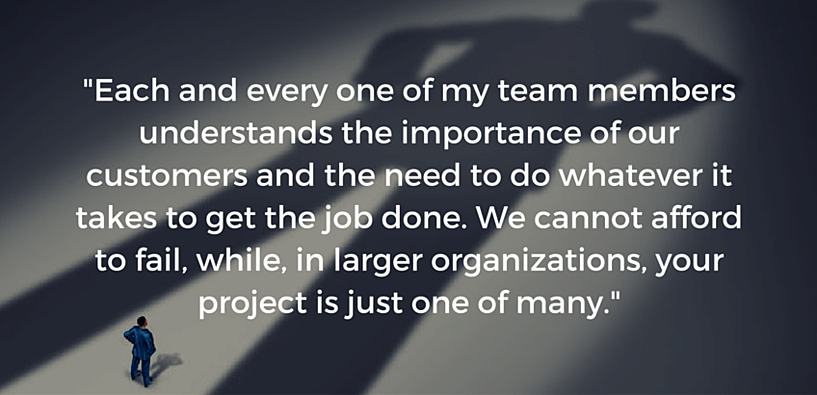Jun 07 2017 What’s Wrong With Being Small

Twenty-five years. This year marks the 25th year for MicroAutomation. Wow, that’s a long time!
A few months ago, when I realized that MicroAutomation has been in existence for almost a quarter century, I found myself reminiscing about the early days and remembering all of the challenges we have faced since we opened our doors.
One of the biggest challenges, I recall, was convincing customers that a small company was just as viable as a big company. There was always this stigma that small companies were not as resilient as large companies. Did we have enough staff to handle the workload? Were we financially secure? Would we be around in a year to service our customers?
Now that I look back, I realize that we prospered all of those years because we are a small company.
Small affords us luxuries that our bigger competitors don’t have. We avoid bureaucracy and burdensome management layers that our bigger counterparts must deal with. We can make a major decision in just a few hours, where larger companies require many briefings and sign offs before they can change direction.
Our size also empowers us to interact more with our customers at all levels of the company. It is not unusual for me as the CEO to be involved in a customer install or handle a support call. Plus, such interactions give my leadership team better insight into our customers’ needs and concerns.
Also, just because we are small doesn’t mean we don’t have the staff to do the job. Being a specialist in contact center and 9-1-1 technologies, I often find that our team is much larger than the team with the similar charter at a larger company. Large companies may have many employees, but most of them have nothing to do with the technology or solution that they are implementing for you.
Then there is our ability to be nimble and adaptive. Our sales, product development and service teams practically all sit in the same hallway and communicate frequently. Our responsiveness and ability to adapt is huge advantage in the marketplace.
This fact became very apparent one day when I was discussing a certification process with one of our large partners. The U.S. Department of Defense requires solutions that are deployed in their facilities be certified in a Joint Interoperability Test Command (JITC) lab in Arizona. Our company has been through the JITC certification process three separate times and has completed the process each time in less than four weeks.
Our partner was telling me that it takes them six to nine months to get the same certification. Why? Because when they find an issue with their product, they have to go back to engineering and the product house to get it changed. That process takes forever in a big company and can be done in a few hours at a small company.
Finally, small companies are just more motivated to succeed than large companies. Each and every one of my team members understands the importance of our customers and the need to do whatever it takes to get the job done. We cannot afford to fail, while, in larger organizations, your project is just one of many. The motivation and dedication of the staff at large company to do the right thing is just not there.
So, as I reflect on 25 years of success in my industry, I find myself feeling more than a little proud that we have survived for such a long time, while some of our larger competitors have moved on. Now, when faced with that same challenge from a potential customer about whether we are large enough to handle a project, I simply remind them that we have been doing what we do longer than most of our competitors – and we are still around to service our customers.
We survived the tech (dot com) bubble and eventual collapse and have continued to prosper. We are still doing what we do – adapting, growing, innovating and responding, just as we have always done.
We are certainly not “Too big to fail.” We are just small enough to succeed.
